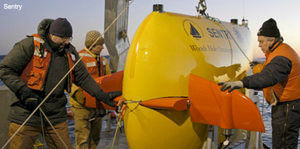Project Neptune
 Oceanography in the desert may seem like an oxymoron, but don’t be fooled, the Center for Biosignatures Discovery Automation is proud to have a team of scientists who are part of the NSF OOI Regional Scale Nodes Network. The Neptune project is centered around a cabled underwater observatory in the Pacific Ocean. The cabled observatory provides high bandwidth and power for real-time oceanographic observations and experiments. Mineral concentrations, gas compositions, biological blooms, and a variety of other information will be gathered by fixed sensors and robotic submersibles. The information they collect will be transmitted to labs, classrooms, and living rooms around the world. The network, spanning the size of an entire tectonic plate, will provide detailed data on a never-before-seen scale.
Oceanography in the desert may seem like an oxymoron, but don’t be fooled, the Center for Biosignatures Discovery Automation is proud to have a team of scientists who are part of the NSF OOI Regional Scale Nodes Network. The Neptune project is centered around a cabled underwater observatory in the Pacific Ocean. The cabled observatory provides high bandwidth and power for real-time oceanographic observations and experiments. Mineral concentrations, gas compositions, biological blooms, and a variety of other information will be gathered by fixed sensors and robotic submersibles. The information they collect will be transmitted to labs, classrooms, and living rooms around the world. The network, spanning the size of an entire tectonic plate, will provide detailed data on a never-before-seen scale.
At the small end of this size spectrum are the tiny inhabitants of the deep – microorganisms. Microorganisms have a tremendous ability to adapt to a variety of extreme environments and so are often found in places you may not expect to find life. These “extremophiles” provide interesting applications for drug discovery, energy production, and bioremediation. More on bioremediation can be found in the video link at the end of this section. Beyond their immediate usefulness, extremophiles may provide us clues to the origins of life as well as its potential future. Many questions arise from the deep.
Why is it that extremophiles can live in temperatures that would normally kill most other organisms? What genes and adaptations have these microorganisms developed that have allowed them to inhabit an ecological niche in areas that previously were thought to be uninhabitable? How can we put these extreme genetic mutations to use in other organisms?
ASU’s Biosignatures Discovery Automation may be the only oceanographic center in Arizona, but we are not alone. Our research is a collaborative work among scientists from the University of Washington, Woods Hole Oceanographic Institution, the Consortium for Ocean Leadership, the National Institute of Advanced Industrial Science and Technology, the Foundation for the Future, and College of Charleston. Biosignatures Discovery Automation is developing instrumentation that will be just as extreme as the organisms they probe, providing answers from the bottom of the ocean.
For more information, feel free to visit Neptune’s Project Website.